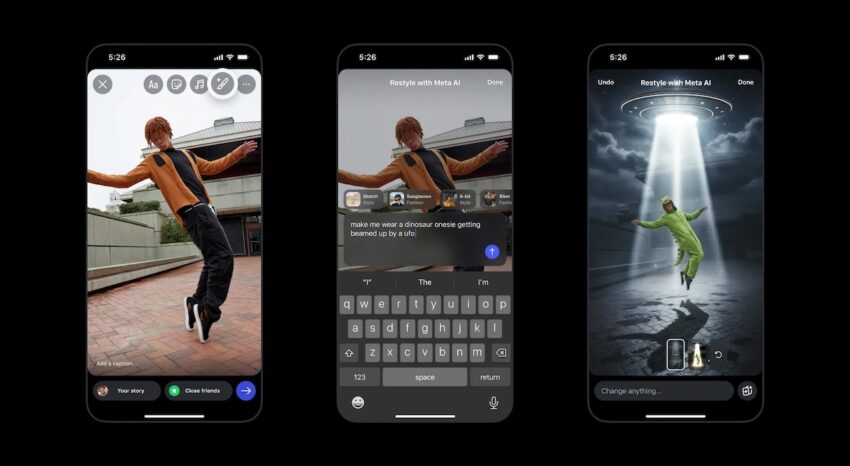
instagram users can now use meta ai Instagram has introduced Meta AI’s photo editing tools directly within its Stories feature, allowing users to enhance their content with advanced editing capabilities.
instagram users can now use meta ai
Overview of Meta AI Editing Tools
Meta AI’s integration into Instagram Stories marks a significant advancement in user-generated content editing. By tapping the paintbrush icon within the Stories interface, users can access a suite of AI-driven editing tools designed to simplify the creative process. This feature allows users to articulate their desired changes through natural language, making it accessible even for those with limited editing experience.
How the AI Editing Tools Work
The functionality of the AI editing tools is straightforward yet powerful. Users can describe specific modifications they wish to make, whether it involves adding elements, removing unwanted objects, or altering existing features in their photos. For instance, a user might type, “Add a sunset in the background,” or “Remove the person on the left,” and the AI will process these requests, delivering results that align with the user’s vision.
This natural language processing capability is a significant leap forward in photo editing technology. Traditionally, photo editing required a certain level of skill and familiarity with complex software. However, with Meta AI, the barrier to entry is lowered, enabling a broader audience to engage in creative expression without the steep learning curve.
Implications for Content Creation
The introduction of AI editing tools in Instagram Stories has several implications for content creators and the platform itself. As users become more adept at utilizing these tools, the overall quality of content shared on Instagram is likely to improve. This enhancement could lead to a more visually appealing feed, attracting more users and increasing engagement rates.
Impact on Influencers and Brands
Influencers and brands, who rely heavily on high-quality visuals to capture audience attention, stand to benefit immensely from these tools. The ability to quickly edit and enhance images can streamline the content creation process, allowing for more frequent and diverse posts. This efficiency can be particularly advantageous in a fast-paced digital landscape where trends change rapidly.
Moreover, brands can leverage these AI tools to create more engaging advertisements and promotional content. By producing visually stunning images that resonate with their target audience, companies can enhance their marketing strategies, potentially leading to increased sales and brand loyalty.
User Experience and Accessibility
Meta’s focus on user experience is evident in the design of these AI editing tools. The intuitive interface allows users to navigate the editing process seamlessly. This accessibility is crucial, as it encourages users of all skill levels to experiment with their content. The natural language feature further democratizes the editing process, making it easier for those who may not be familiar with traditional editing software.
Potential Challenges and Limitations
Despite the advantages, there are potential challenges and limitations associated with the use of AI editing tools. One concern is the accuracy of the AI’s interpretations of user requests. While the technology is advanced, it may not always deliver results that meet user expectations. For example, if a user requests a specific change that the AI misinterprets, it could lead to frustration and dissatisfaction.
Additionally, there is the question of authenticity in content creation. As AI tools become more prevalent, there may be concerns about the authenticity of images shared on social media. Users may question whether the visuals they see are genuine or heavily manipulated. This could lead to a shift in how audiences perceive content, potentially impacting trust in influencers and brands.
Stakeholder Reactions
The introduction of Meta AI editing tools has garnered mixed reactions from various stakeholders within the social media landscape. Content creators have expressed excitement about the new possibilities for enhancing their work. Many influencers have taken to social media to share their experiences with the tools, highlighting how they can save time and improve the quality of their posts.
On the other hand, some critics have raised concerns about the implications of AI-driven editing on creativity. They argue that reliance on AI tools may stifle originality, as users may lean towards automated solutions rather than developing their unique editing styles. This debate underscores the ongoing tension between technology and creativity in the digital age.
Industry Experts Weigh In
Industry experts have also weighed in on the potential impact of AI editing tools on social media. Some believe that these tools could lead to a new era of content creation, where users can produce professional-quality images with minimal effort. Others caution that the proliferation of AI editing could lead to a homogenization of content, where unique styles and voices become diluted in favor of AI-generated aesthetics.
Future Developments and Innovations
As Meta continues to refine its AI editing tools, future developments may include more advanced features that enhance user experience. Potential innovations could involve improved machine learning algorithms that better understand user requests, allowing for more accurate and nuanced edits. Additionally, the integration of augmented reality (AR) elements could further expand the creative possibilities for users.
Moreover, as competition in the social media space intensifies, other platforms may seek to implement similar AI-driven features. This could lead to a broader trend of AI integration in social media, fundamentally changing how users interact with and create content.
Conclusion
The integration of Meta AI editing tools into Instagram Stories represents a significant advancement in the realm of social media content creation. By enabling users to edit their photos through natural language requests, Meta is not only enhancing user experience but also democratizing the creative process. While there are challenges and concerns to consider, the potential benefits for content creators, brands, and the platform as a whole are substantial. As technology continues to evolve, it will be crucial to monitor how these tools shape the future of digital content and user engagement.
Source: Original report
Was this helpful?
Last Modified: October 24, 2025 at 9:36 am
4 views















